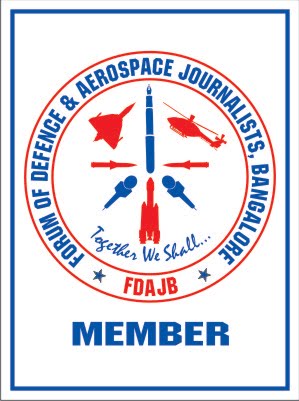ALL PHOTOS: AUGUST 2003

(Above) A Mig-21 aircraft on static display at Jamnagar. (Below) The
author in uniform (extreme left) in the ante-room of the Officers' Mess at Air
Force Station, Jamnagar with some of the squadron pilots and ladies from No.
108 Squadron "Hawk Eyes" during the media interaction.
(Above) A Flying Officer (unidentified) of No. 108 Squadron taking on a question posed by the journalists. (Below) Some of the squadron pilots and ladies from No. 108 Squadron "Hawk Eyes" during the media interaction. Please note the Mig-21 painting with reheat showing.
(Above) The then Commanding Officer of "Hawk Eyes"
Squadron, Wg Cdr Mohan Rao in uniform (left) in the ante-room of the Officers'
Mess at Air Force Station, Jamnagar. (Below) The view of the ante-room of the Officers' Mess with the journalists seated facing
the IAF men.
By Gp. Capt. Tarun Kumar Singha, Chief PRO (Defence)
 |
| Gp. Capt. T.K. Singha |
 The
recent Indian Air Force (IAF) Mig-21 accidents, unlike in the past, were not adversely
reported upon by the media, this time around.
The
recent Indian Air Force (IAF) Mig-21 accidents, unlike in the past, were not adversely
reported upon by the media, this time around.
But
the first few years at the turn of the new millennium wasn’t exactly too
pleasing for the IAF leadership. Following a spate of crashes, media dubbed the
mainstay of IAF - the Mig-21 - with an unsavoury sobriquet of ‘flying coffin’.
Every
Mig-21 crash recounted tragic stories of young pilots being done to their
deathly doom.
Protracted
delays in acquiring advanced jet trainers weren’t helping the cause either. Stories
of IAF fighter pilots not getting willing brides also began appearing in the
media.
Public
perceptions needed to be quickly corrected. The IAF’s Institute of Flight
Safety had statistics that proved IAF accident rate was not alarming; on the
contrary, comparable with some of the leading air forces around the world.
To
dispel notions of its dipping safety record, the then Defence Minister also undertook
a sortie in a Mig-21, on August 1, 2003, to silence critics.
Against
this backdrop, the IAF in August 2003 set about rallying the youth of Gujarat,
having a sizeable ‘recruit-able male population’ (RMP), to join IAF. A
motivational ‘air show’ for the public was planned at Air Force Station,
Jamnagar.
A
new PR office of the Ministry of Defence, meanwhile, had just been set up for
the region at Ahmedabad in 2003. Being a major public event, media was
specially invited and flown from Ahmedabad to Jamnagar.
Often,
most complex scenarios get resolved with most basic a solution – with open
mindedness. Until then, none bothered to hear what the IAF pilots, who flew
these supersonic jets, had to say. It was decided to give them a chance to have
their say.
The
plan was simple. The PRO was to moderate a one-on-one session of the media with
pilots of the Jamnagar-based Mig-21 Squadron. For an added measure, spouses of
those married also joined them. There were to be no other senior IAF officials
present for the interaction that might ‘inhibit’ the young pilots.
The
Commanding Officer (CO), Flight Commander (Flt Cdr) and their ‘boys’ were all
there. Seated against the backdrop of their squadron crest, and a picture of a
Mig-21, the squadron pilots were ready to face the media.
After
brief introductory remarks, the interaction began with a barrage of questions. Banal
questions were answered with patience; and the serious ones, with answers that were
supposed to run shivers down an adversary’s spine.
On
a query as to what they thought of the Mig-21 flight made earlier in the month
by the Defence Minister to endorse its safety record, a young pilot clarified:
“I don’t need an endorsement from anyone. As long as my CO, my Flt Cdr continue
to fly, I will also do the same,” reasserting the trust on his superiors and
the aircraft to the hilt.
To
the most pervasive question of the Mig-21s being dubbed ‘flying coffins’, the
Flt Cdr said: “You may associate the word ‘flying coffins’ with our Mig-21s.
Because that’s exactly what we intend delivering to our enemies when we fly in
it (Mig-21).”
The
headlines were already being framed at the venue itself.
The
squadron ladies then blew to smithereens, the issue of ‘luckless marriages’ for
young fighter pilots. Most echoed that they were aware of their husband’s
high-risk profession, but marrying them was a conscious decision.
They
stated their pilot-husbands were far safer flying their Mig-21s than driving on
Indian roads that had death lurching in almost all bends. Despite the ‘flying
coffin’ stories, they were ‘happy and proud’ marrying the ‘dashing brave
hearts’ who flew them.
Seldom
are journalists overwhelmed at media interactions, but this one surely did them
in. The meeting was to have a profound impact on the way media reported on the
IAF Mig-21 accidents from thereon.
‘Flying
coffin’ as a cliché, is almost a taboo now for media when reporting Mig-21
accidents in the present times.
The
IAF went on to induct the ‘Hawks’ Advanced Jet Trainer (AJT) in February 2008,
bringing with it a paradigm shift in the training curriculum of ab-initio
fighter pilots before their transition to supersonic jets.
While
an array of modern fighter jets are set to metamorphose the combat potential of
the IAF in the years ahead, Mig-21 pilots of the yore and the present, would
still swear by the aircraft’s potency, capable of being one among the varied aerial
platforms that could deliver ‘coffins’ to the enemies.
(The author is an ex-Mig-21 pilot & was the PRO (Defence) at Ahmedabad in 2003.)
(Do you have an interesting defence-aviation story to share? If so, email them to anantha.ak@gmail.com or ak.tarmak007@gmail.com. Also check Write Now!)




























